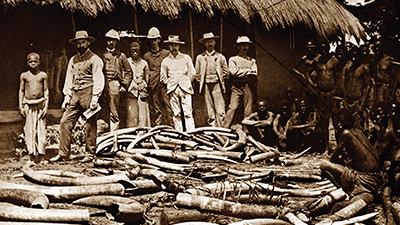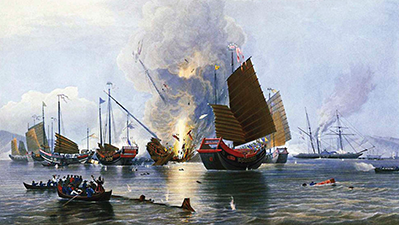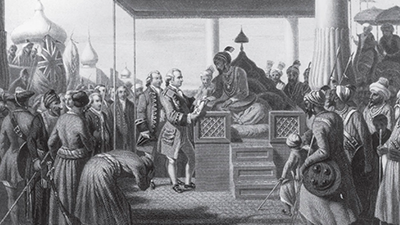Colonialism
Teacher Resources
Driving Question: What motivated colonialism, and what were the goals of colonial powers?
What really drives one country to control another? During the nineteenth century, colonial powers expanded with promises of trade and progress, but their goals often mixed ambition, economic manipulation, and political control.
Learning Objectives:
- Analyze the causes and consequences of colonialism in different societies around the world.
- Improve sourcing skills by evaluating differing perspectives on imperialism.
- Use the historical thinking practice of contextualization to analyze the conditions that led to the Opium Wars.
Vocab Terms:
- administrator
- colonialism
- customs
- deindustrialization
- exploitative
- racism
- resistance
Opener: Colonialism
To teach this lesson step, refer to page 2 of the Lesson 6.3 Teaching Guide.
Our Openers and Closers Guide will provide more information about these short, but important, activities at the beginning and end of each lesson.
Start connecting industrial advances to imperialism by looking at how new technologies and economic systems gave empires more reach, control, and ambition.
Debating Imperialism
To teach this lesson step, refer to page 3 of the Lesson 6.3 Teaching Guide.
Check out our Sourcing One-Pager for a quick review of this important historical thinking skill.
Add depth to your understanding of imperialism by seeing how it was viewed differently across time and place. In the process, you’ll explore how historical sources reflect bias, perspective, and lived experience.
Conquest and Control
To teach this lesson step, refer to page 7 of the Lesson 6.3 Teaching Guide.
Imperial powers ruled their colonies through violence and coercion. Discover how that played out across the globe and use evidence to test claims about the realities of colonial rule.
-
Guiding Questions
-
Before you read
Preview the questions below, and then skim the article. Be sure to look at the section headings and any images.
While you read
Look for answers to these questions:
- How is Henry Morton Stanley’s journey in Africa described?
- Why was the early phase of colonialism especially violent?
- How did economic goals lead to violent practices in colonies?
- What ideas were used to justify the use of violence?
- What were some psychological effects of colonialism?
After you read
Respond to these questions: Do you think the suffering caused by colonialism outweighs any benefits? Why or why not?
The Opium Wars
To teach this lesson step, refer to page 2 of the Lesson 6.3 Teaching Guide.
In this discussion in the OER Project Community forum, educators share how they teach contextualization to help students connect historical events to broader circumstances.
-
Guiding Questions
-
Before you read
Preview the questions below, and then skim the article. Be sure to look at the section headings and any images.
While you read
Look for answers to these questions:
- What is economic imperialism, and why did some empires use it?
- Why was tea important in the relationship between Britain and China?
- What did Britain sell to China, and how did the Chinese government respond?
- What caused the First Opium War?
- What were the “unequal treaties,” and what did they do?
After you read
Respond to this question: How might the history of the Opium Wars still influence global affairs today?
Closer: Colonialism
To teach this lesson step, refer to page 11 of the Lesson 6.3 Teaching Guide.
The OER Project Community forum is a great place to engage with other educators about World History 1200 to Present.
The British Raj
To teach this lesson step, refer to page 11 of the Lesson 6.3 Teaching Guide.
The British imperialists who established colonial control of India worked hard to ensure that the colony remained dependent on Britain and provided a steady supply of raw materials to feed British factories.
-
Guiding Questions
-
Before you read
Preview the questions below, and then skim the article. Be sure to look at the section headings and any images.
While you read
Look for answers to these questions:
- What effects did the industrialization of cotton cloth production have on the Indian economy?
- Why was deindustrialization a bad thing for India?
- What political explanations does the author give for this economic failure?
- Why did India suffer so many famines in the nineteenth century?
After you read
Respond to this question: How does an event like the deindustrialization of India support, extend, or challenge what you have learned about the effects of the Industrial Revolution on economic systems?






